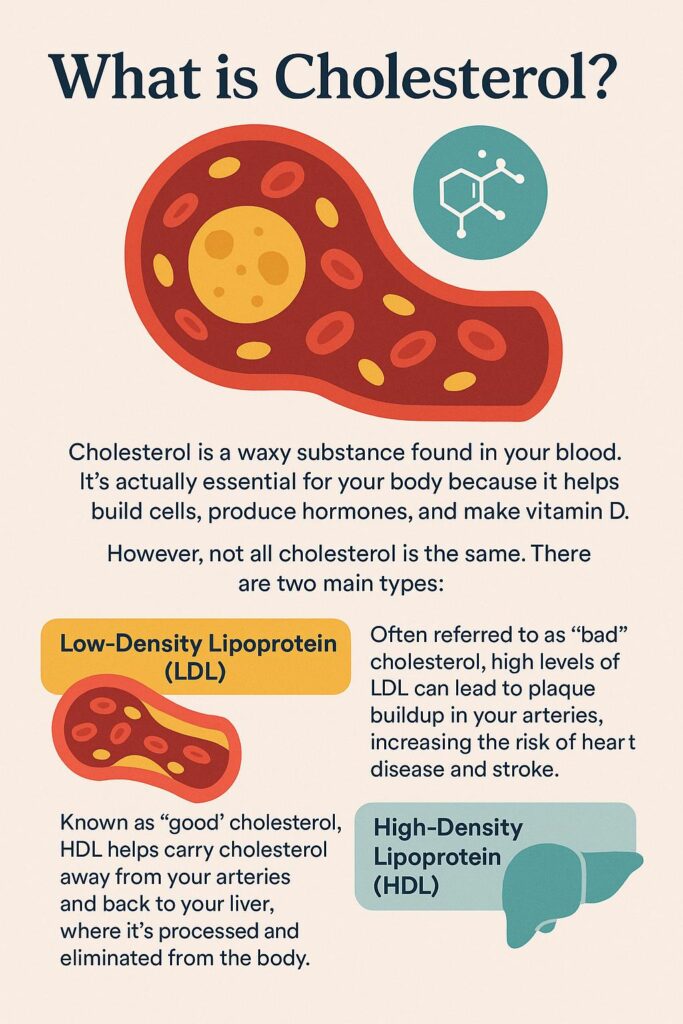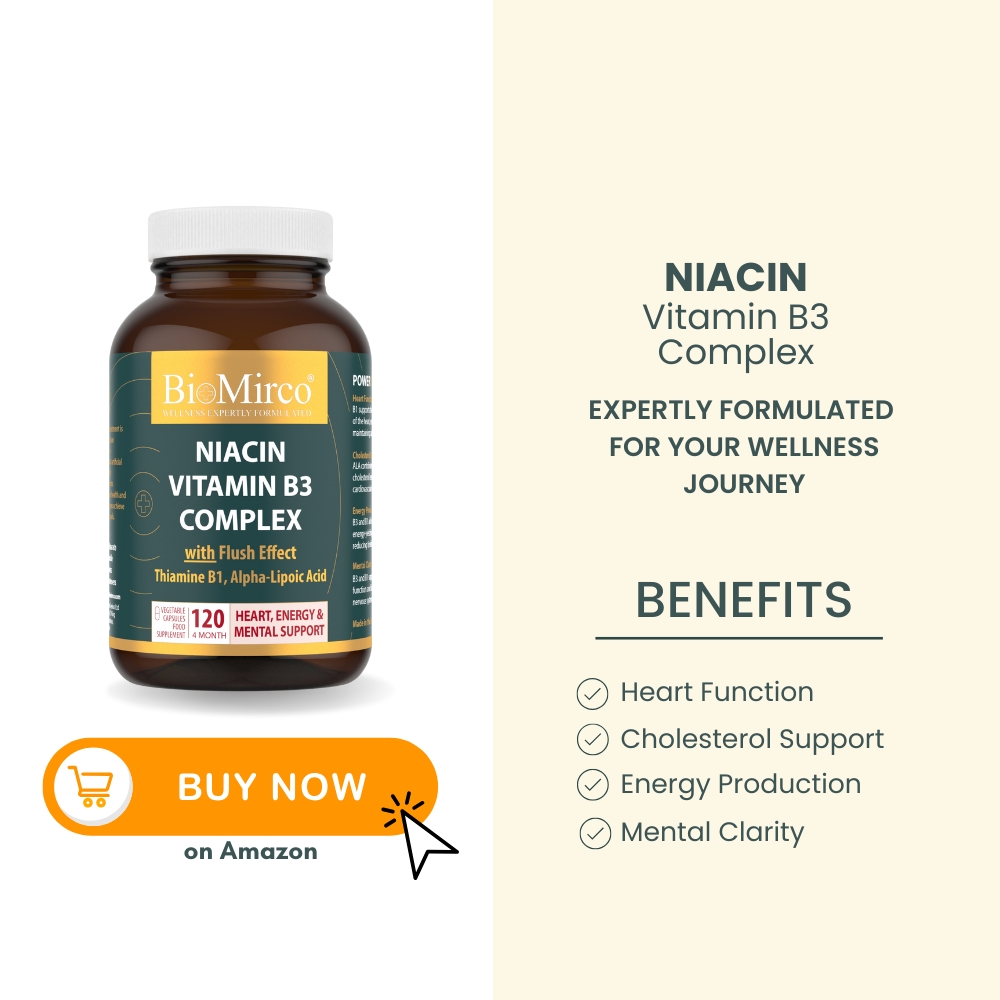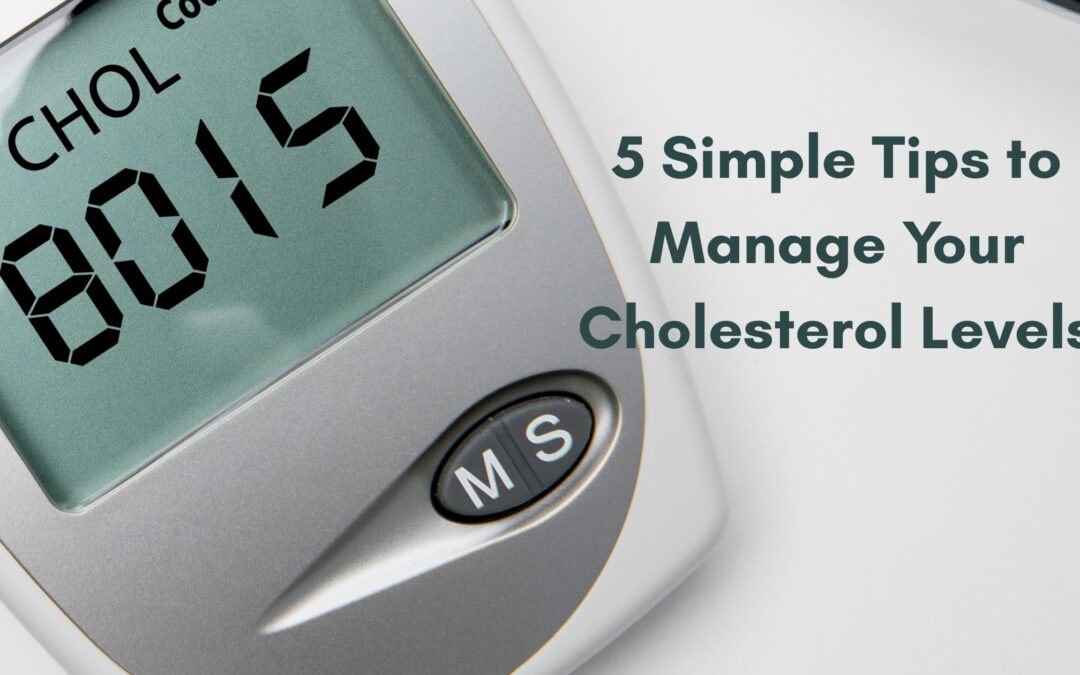Cholesterol is a word we often hear, but what does it really mean? It’s important to understand cholesterol and its role in our bodies, especially when it comes to maintaining healthy levels. In this article, we’ll explore what cholesterol is, why it matters, and how you can support your health through diet and supplements.
What is Cholesterol?
Cholesterol is a waxy substance found in your blood. It’s actually essential for your body because it helps build cells, produce hormones, and make vitamin D. However, not all cholesterol is the same. There are two main types:
- Low-Density Lipoprotein (LDL): Often referred to as “bad” cholesterol, high levels of LDL can lead to plaque buildup in your arteries, increasing the risk of heart disease and stroke.
- High-Density Lipoprotein (HDL): Known as “good” cholesterol, HDL helps carry cholesterol away from your arteries and back to your liver, where it’s processed and eliminated from the body.
Balancing these two types is crucial for maintaining heart health.

Why Are Cholesterol Levels Important?
Monitoring your cholesterol levels is vital because they can impact your overall health significantly. High levels of LDL cholesterol can lead to serious health issues, including:
- Heart Disease: A condition where plaque builds up in the artery walls, narrowing them and restricting blood flow.
- Stroke: When blood flow to the brain is blocked, often due to a blood clot.
- Peripheral Artery Disease: Reduced blood flow to the limbs, causing pain and mobility issues.
Maintaining healthy cholesterol levels is essential for reducing these risks and promoting better health.
What Affects Cholesterol Levels?
Several factors can influence your cholesterol levels, including:
- Diet: Foods high in saturated fats, trans fats, and cholesterol can raise your LDL levels. On the other hand, a diet rich in fruits, vegetables, whole grains, and healthy fats can help maintain healthy levels.
- Physical Activity: Regular exercise can help raise HDL cholesterol and lower LDL cholesterol. Aim for at least 150 minutes of moderate aerobic activity each week.
- Weight: Being overweight can increase your LDL levels. Losing even a small amount of weight can help improve your cholesterol levels.
- Smoking: Smoking lowers HDL cholesterol and is a major risk factor for heart disease.
- Genetics: Some people are genetically predisposed to high cholesterol levels, regardless of their lifestyle choices.
How Can You Manage Your Cholesterol Levels?
Managing your cholesterol levels involves a few key lifestyle changes:
1. Consider Supplements
Certain supplements may support your cholesterol levels. For example, niacin (vitamin B3) has been shown to have potential benefits for cholesterol management.
2. Eat a Heart-Healthy Diet
Focus on incorporating foods that can help lower LDL cholesterol and raise HDL cholesterol. Here are some tips:
- Choose Healthy Fats: Opt for unsaturated fats found in olive oil, avocados, and nuts while avoiding large amounts of saturated fats found in red meat and full-fat dairy products.
- Increase Fibre Intake: Foods high in soluble fibre, such as oats, beans, and fruits, can help reduce cholesterol absorption.
- Include Omega-3 Fatty Acids: Fatty fish like salmon and mackerel can help improve heart health.
3. Exercise Regularly
Physical activity can help boost your HDL cholesterol while lowering LDL levels. Aim for at least 30 minutes of moderate exercise most days of the week. Activities like walking, swimming, and cycling are excellent choices.
4. Maintain a Healthy Weight
If you’re overweight, losing even a small amount of weight can help improve your cholesterol levels. Focus on a combination of healthy eating and regular physical activity.
5. Avoid Tobacco Smoke
If you smoke, quitting can improve your HDL cholesterol levels and benefit your heart health. Avoid secondhand smoke as well.
Niacin Benefits
Niacin can help increase HDL cholesterol while lowering LDL cholesterol and triglycerides. It’s important to consult with a healthcare professional before starting any new supplement.

Introducing Niacin Vitamin B3 Complex
If you’re looking for a quality supplement to support your cholesterol and overall health, consider Niacin Vitamin B3 Complex. Here’s why it might be a great addition to your health routine:
- Potent Formula: Each capsule contains a therapeutic dose of niacin, designed to support cognitive function and energy metabolism.
- Easy to Take: The small capsules are easy to swallow, making it convenient to incorporate into your daily routine.
- Quality Assurance: Made in the UK, this product meets high-quality standards, ensuring you get the best for your health.
Advantages of Vitamin B3
- Supports Energy Production: Niacin plays a crucial role in converting food into energy.
- Promotes Skin Health: It can help maintain healthy skin and may assist in reducing skin issues.
- May Aid Cognitive Function: Niacin is also linked to supporting brain health and mental clarity.
Understanding cholesterol and its impact on your health is crucial. By making thoughtful dietary choices, engaging in regular physical activity, and considering quality supplements like Niacin Vitamin B3 Complex, you can take proactive steps to manage your cholesterol levels and support your overall health.
Remember, always consult with a healthcare professional before starting any new supplement, especially if you have existing health conditions or are taking medication.

Please Note:
The information provided in this article is for educational purposes only and is not intended as medical advice. Always consult with a healthcare professional before starting any new supplement, especially if you are pregnant, breastfeeding, have existing health conditions, or are taking medication. Individual results may vary, and it is important to discuss any concerns or questions about your health with a qualified medical provider.
Source:

